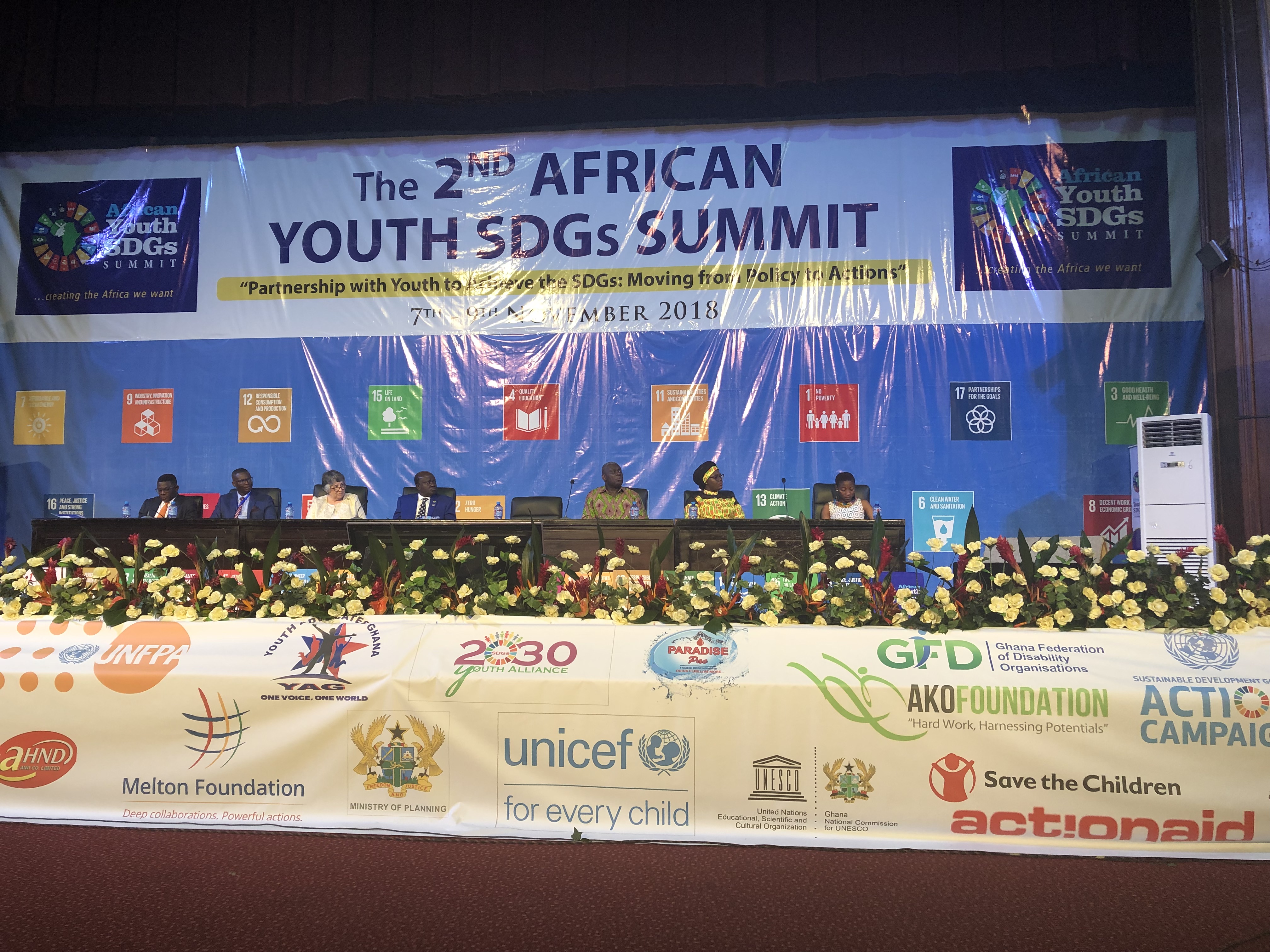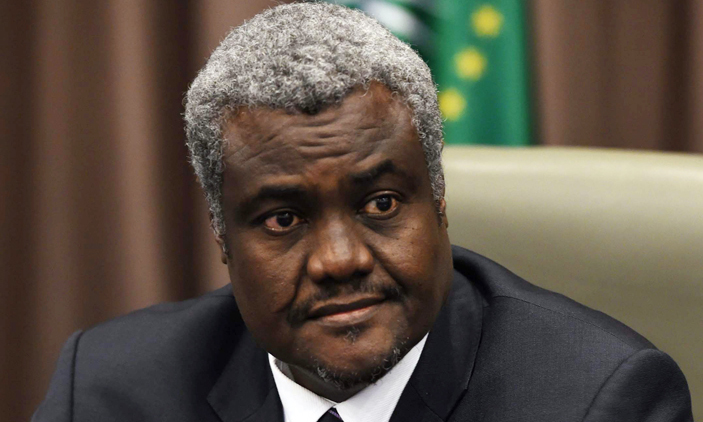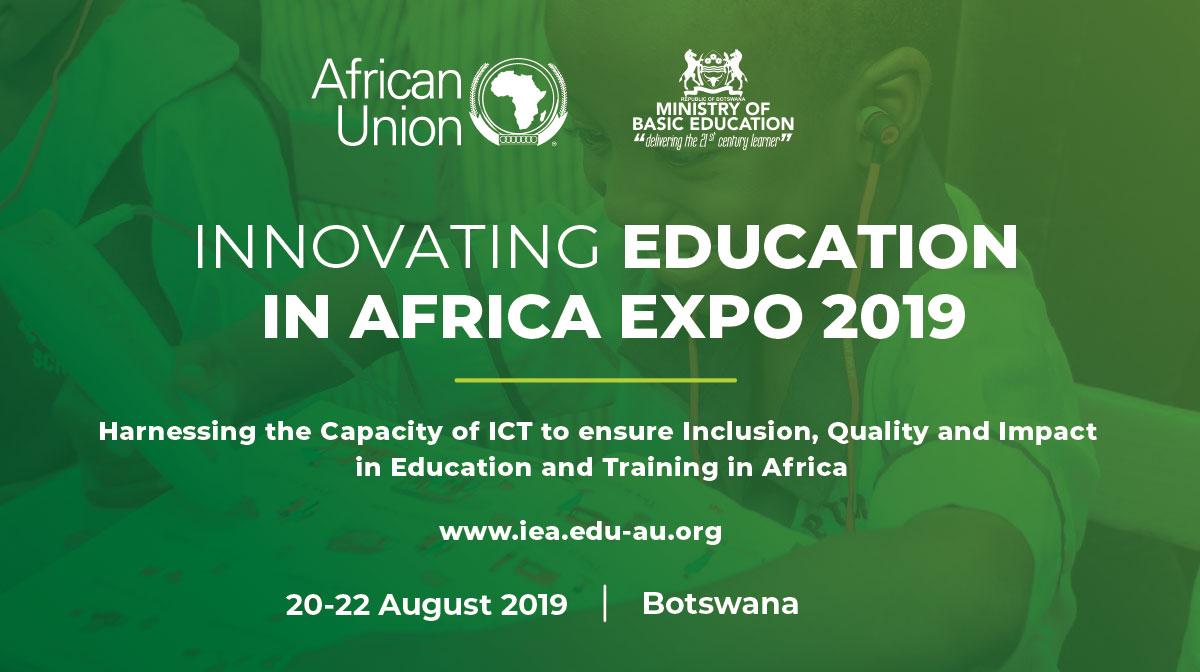We, the Youth of Africa, having met and participated in the 2nd African Youth SDGs Summit held in Accra, Ghana, from the 7th to 9th of November 2018, collectively discussed, connected and advocated to move from policy to action in the implementation of the Agenda 2030 and Agenda 2063;
That in the spirit of the African Youth Charter, moving forward with the African Youth Decade Plan of Action, pursuing the full implementation of the UN Youth Strategy and the fulfilment of provisions in the National Youth Policies of our various countries;
That, in our conviction, the development of our continent is predicated on the state, development and preparedness of us Youth for the present and the future;
Make the following resolutions;

We call on our governments to take action on:
GOAL 3:Good Health and Well Being
1- Make health centers in Africa youth-friendly, accessible, affordable and proactive in the delivery of all health services for all young people.
2- Fulfill the Abuja Declaration of 15% national budgets to ensure increase in national funding for health services including access to Sexual and Reproductive and Health Rights (SRHR) Information and Services (e.g. maternal healthcare, contraceptives and comprehensive abortion care services in the context of the law, comprehensive sexuality education for in-school and out of school youth).
3- Work towards achieving Universal Health Coverage (access to health facilities, essential services, essential drugs and qualified health professionals, including for mental health) for all groups, including marginalized groups.
4- Prioritize and invest in nutrition for young mothers and children.
5- Improve access to Water and Sanitation including improved hygiene and access to sanitary services (including access to free sanitary pads for girls) to ensure that both girls and boys are able to attend school to their fullest levels.
GOAL 4:Quality Education
6- Provide inclusive education for all, ensuring educational facilities are accessible, safe, friendly and inclusive for young people with disabilities and special needs.
7- Improve the quality of education, by ensuring proper training of teachers and school leaders, involving communities and parents, improving school facilities and promoting active teaching and learning.
8- Ensure availability of and access to inclusive and appropriate teaching and learning materials for all ages, sex and abilities for teachers, children and youth in schools.
9- Improve access to Information and Communication Technology (ICT) in education (e.g. build and resource computer laboratories at the basic and secondary institutions and institutions of higher learning).
10- Improve and expand access to education for all children and youth in Africa by expanding options for African youth including through improvement of technical and vocational education and through STEM and Arts.
GOAL 5: Gender Equality
11- Strengthen the implementation of national policies and laws on ending gender-based violence, including child marriage, female genital mutilation and other harmful practices.
12- Implement and domesticate international laws and policies that ensure young people’s protection from Gender-Based Violence, reproductive rights of women and safe motherhood practices (e.g. Maputo Protocol, Maputo Plan of Action and Addis Ababa Declaration on Population and Development).
13- Ensure consistent data collection at national level on issues of gender equality for informed decision making and inclusive gender positive development planning and delivery.
GOAL 6: Clean Water and Sanitation
14- Increase budgetary allocation to the water sector.
15- Prioritize policies and programmes that ensure expansion of access to clean water and improved sanitation infrastructure including waste management (e.g. recycling and disposal programs for sanitary pads, diapers and other waste materials) in African communities.
16- Enforce policies to protect water sources and the environment from pollution and waste.
17- Strengthen monitoring, supervision and enforcement of environmental protection laws especially in communities of active extractive industry operation.
18- Institute and enforce laws that hold industries responsible towards environmental sustainability, rehabilitation and safe guard water sources.
GOAL 8: Decent Work and Employment
19- Increase financial commitments to youth development and employment
20- Create a supportive environment to drive youth innovations and entrepreneurship
21- Invest in and develop young people with professional skills by creating opportunities for participation, access to labour market information, capacity building, mentoring and vocational trainings.
22- Create opportunities for youth exchange across African countries to facilitate cross cultural and cross–country education, training, learning, continental integration and employment to address irregular migration and emigration from the continent.
GOAL 13. Climate Action
23- Increase the participation of African youth in the green economy and create incentives for young African entrepreneurs investing in the green economy.
24- Establish the African Youth Green Fund at national and continental levels to attract, support and empower youth innovators in the green economy.
25- Invest in research and development of opportunities in green economy in Africa.
26- Implement policies and strategies to transition African countries to sustainable renewable energies.
GOAL 16: Peace, Justice, and Strong Institutions
27- Strengthen cooperation and partnership between social justice institutions and youth organizations to accelerate SDGs implementation.
28- Domesticate and implement the African Charter on Democracy, Elections and Governance to ensure functional and independent democratic institutions.
29- Increase participation of youth, women, the marginalized and hard-to-reach groups in governance, policy development and national decision making processes by creating opportunities and safe spaces.
30- Strengthen, resource and promote the independence of electoral bodies to ensure credible, transparent, free and fair elections.
31- Strengthen and ensure independence of law enforcement institutions including anti-corruption and human rights protection agencies to become fair, just and secure.
32- Strengthen enforcement of laws towards corruption and illicit financial flows.
We call on Development Partners to;
33- Support capacity building of youth, youth networks and youth-led initiatives to strengthen youth activism and actions towards attainment of the Agenda 2030 and Agenda 2063.
34- Support the African Youth SDGs Summit as a rallying point of ideas, innovations, actions and accountability for and by young people of Africa both at the national and at the continental levels.
35- Provide technical and funding support to youth groups, networks, organizations and events that are focused on positively directing youth energies to attainment of national, regional, continental and global development.
36- Commit to the full implementation of programmes and policies aimed at increasing the meaningful participation of young people in the design ,implementation and evaluation of programeme e.g. UN Youth Strategy, African Youth Charter etc.
We call on the Private Sector Partners to;
37- Create spaces for mentorship and capacity building for youth of Africa to further build and develop post academic competencies and make the youth ready for the job market.
38- Channel the corporate social responsibility actions towards supporting and advancing youth initiatives on the continent while empowering the youth to implement their innovative ideas and inventions.
39- Adopt and implement environmentally friendly programmes and projects including investing in recycling and rehabilitation of the environments, reduction in pollution and the emission of hazardous chemicals as part of their contribution to attaining the sustainable development goals.
40- Ensure the payment of taxes, royalties, dividends and compensations to government, local communities and people whose natural resources are exploited as part of your business operations.
41-Commit to the fight against corruption by avoiding acts and practices that compromise on their integrity and operations on the continent.
42- Support African governments in the spirit of multi-stakeholder partnership in the implementation of the SDGs and the Agenda 2063.
43- Invest in productive sectors of African economies including in education, transportation, industrialisation, technology, social development.
We call on all African youth to work in partnership with the Youth Advocates Ghana, the 2030 Youth Alliance and all stakeholders at different levels to:
44- Monitor and evaluate the implementation of the SDGs at different levels using the accompanying targets and indicators.
45- Build the capacity of youth civil society organizations to increase awareness, support, and mobilization for the SDGs implementation.( e.g. active participation of youth in the Voluntary National Reviews and the High level Political Forum).
46- Become actively engaged in the political, social, economic and institutional development processes of their respective countries, bring their ideas and views into development policies formulation, implementation, monitoring and evaluation at the local, national regional and continental level.
47- Advocate jointly using diverse innovative means to hold duty-bearers accountable for the implementation of the SDGs.
48- Develop and initiate innovative programmes and projects to drive the attainment of the various SDGs in their localities and countries.
49- Become ambassadors of progressive actions towards the environment, peace, security and development of their communities.
50- Hold your leaders accountable for the application of public resources for the common good of all.
We invite African youth to lead by example by embodying the values of the SDGs and Agenda 2063 while working for the development of people, creating and maintaining partnerships, sustaining peace, protecting the planet and contributing to prosperity on the continent.
The End.






